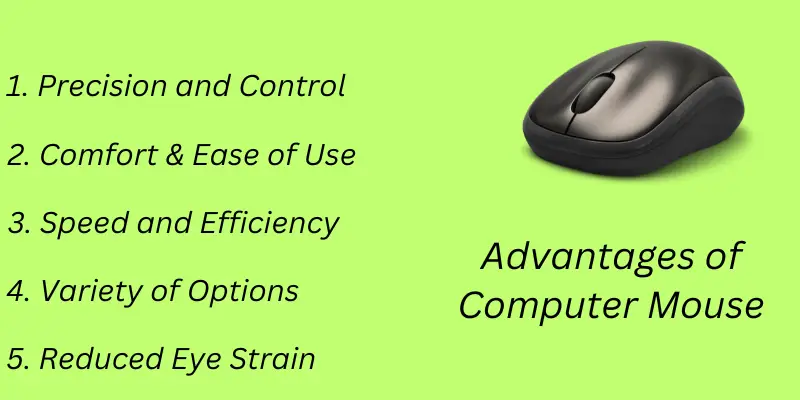What You Need to Know About Computer Mouse Pros and Cons
Published: 29 Jun 2025
The computer mouse, first invented in the 1960s, has become one of the most widely used input devices in the world. Today, mice come in many types—wired, wireless, ergonomic, and even special ones made for gaming. They are known for their speed, accuracy, and ease of use. However, while a mouse can improve how we work or play, using it for long hours can sometimes cause hand or wrist discomfort. That’s why it’s important to understand both the advantages and disadvantages before choosing the right mouse for your needs.
Advantages and Disadvantages of Computer Mouse
A computer mouse is an essential everyday tool for work, gaming, and browsing. It allows you to navigate the screen more rapidly, but like any other device, it has pros and cons. Let’s look at the 10 advantages and disadvantages of a computer mouse and how they apply to different users, such as students.
Advantages of Using a Computer Mouse
A computer mouse has many advantages, making it the preferred input device for many users. Let’s have a look at a few important advantages of computer mice:

1. Precision and Control:
A computer mouse gives you accurate control over the pointer on your screen. This is very important for tasks that need exact movements—like drawing, editing photos, playing games, or selecting small items in a document. The pointer goes exactly where you want it to, making your work faster and more accurate.
2. Comfort and Ease of Use:
Using a mouse feels natural because your hand rests in a relaxed position. Unlike touchpads or screens that require tapping or swiping, the mouse allows smooth hand movements. This makes it more comfortable to use for longer hours, which is helpful for students, office workers, designers, and gamers.
3. Speed and Efficiency:
A mouse helps you move around the screen quickly. You can scroll through documents, click buttons, or open programs faster than with a keyboard or touchpad. This saves time and makes it easier to multitask or finish your work sooner.
4. Variety of Options:
There are many types of mice for different needs. Basic wired mice are good for everyday use. Ergonomic mice are shaped to fit your hand and prevent wrist pain. Gaming mice have extra buttons and fast sensors for better control in games. You can choose the one that works best for your job, study, or hobby.
5. Reduced Eye Strain:
A mouse lets you reach things on the screen directly with just a click. This reduces extra movements like dragging or tapping repeatedly. Less screen movement can help reduce eye strain, especially when using the computer for a long time.
Disadvantages of Using a Computer Mouse
While the mouse has many benefits, it also has significant drawbacks. Here are five disadvantages that users should consider.

1. Risk of Repetitive Strain Injuries (RSI):
Using a computer mouse for long hours without breaks can lead to wrist, finger, or hand pain. Over time, this may develop into a condition called Repetitive Strain Injury (RSI). This is common among office workers, gamers, and students who use a mouse daily for long periods.
2. Dependence on a Level Surface:
A mouse works best when placed on a stable, flat surface like a desk or mouse pad. This becomes a problem if you’re trying to use it in bed, on a couch, or while traveling without a table. Without the right surface, the mouse doesn’t move smoothly.
3. Learning Curve for New Users:
People who are new to computers—like children or elderly users—might find it difficult to use a mouse at first. They may struggle with moving the cursor, double-clicking, or using scroll buttons. It takes some time and practice to get used to it.
4. Limited Movement Flexibility:
Unlike touchscreens or built-in laptop touchpads, a mouse can’t be used easily on uneven or soft surfaces. This limits its flexibility. For example, using a mouse on your lap, pillow, or sofa usually doesn’t work well.
5. Battery Dependency (for Wireless Mice):
Wireless mice are convenient because they don’t have cables, but they need batteries or charging. If the battery runs out during work or gaming, it can interrupt your tasks. Users must remember to charge or replace batteries regularly.
Also Read This Article👇👇
Pros and Cons of Thin and Lightweight Laptops
Advantages and Disadvantages of Computer Keyboards
Advantages and Disadvantages of Speakers
Advantages and Disadvantages of Webcams
Laptop vs Desktop: Pros and Cons
Advantages and Disadvantages of Internet for Students
10 Reasons Why Every Student Should Own a Laptop
10 Incredible Benefits of Laptops You Need to Know
How to Use a Laptop for the First time
Types of Computer Mice and Their Pros & Cons
There are several types of computer mice, each designed to meet specific user needs. Let’s explore the most common types and their pros and cons:
Wired vs Wireless Mice:
Wired Mice: Offer reliability and don’t require batteries, but the cable can limit movement.
Wireless Mice: Provide freedom of movement and reduce cable clutter, but they require battery replacement or charging.
Ergonomic Mice:
Advantages: Ergonomic mice are designed to reduce strain and promote comfort, making them ideal for extended use.
Disadvantages: They tend to be bulkier and may take some time to adjust to due to their unique shapes.
Gaming Mice:
Advantages: High precision, customizable buttons, and higher DPI make gaming mice ideal for competitive players.
Disadvantages: They are often more expensive and may offer features that are unnecessary for general computer users.

Conclusion
The advantages and disadvantages of computer mice are clear: they give comfort, precision, and speed, but they can also cause repetitive strain injuries and require a level surface. Knowing this information can help you select the best mouse for your needs, whether you’re a student, a worker, or a gamer. Choose one that suits your lifestyle, whether for daily use, work, or more particular tasks such as gaming or designing.
Which type of mouse do you choose? Please share your opinions and observations in the comments below!
Consider using an ergonomic mouse, taking regular breaks, and ensuring your workspace is set up properly to support your wrists.
Yes, wireless mice are reliable, but they require battery maintenance. If you’re concerned about battery life, you can opt for a rechargeable model.
If you’re a casual gamer, a standard mouse should suffice. However, gaming mice offer extra features like customizable buttons and higher precision, which can improve gameplay.
Advantages of a computer mouse:
- Easy to use:
A computer mouse is simple. Just move it and click to select anything on the screen. - Fast navigation:
You can open files, play games, or browse the internet quickly using a mouse. - Good for drawing:
A mouse helps you draw shapes and pictures in painting programs. - Better for games:
Many computer games work better with a mouse than a keyboard. - Helps beginners:
It’s great for young students learning to use a computer.
Disadvantages of a computer mouse:
- Needs a flat surface:
The mouse doesn’t work well on soft or uneven places. - Can get damaged:
If the mouse falls or gets wet, it might stop working. - Wired mouse has long cables:
The wire can get tangled and messy on your desk. - Wireless mouse needs battery:
You have to replace or charge the battery when it runs out.

- Be Respectful
- Stay Relevant
- Stay Positive
- True Feedback
- Encourage Discussion
- Avoid Spamming
- No Fake News
- Don't Copy-Paste
- No Personal Attacks



- Be Respectful
- Stay Relevant
- Stay Positive
- True Feedback
- Encourage Discussion
- Avoid Spamming
- No Fake News
- Don't Copy-Paste
- No Personal Attacks





